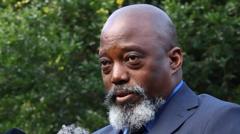The prohibition was articulated in an interior ministry statement that highlighted Kabila's party's "ambiguous attitude" towards the M23's occupation of Congolese land. Authorities noted that Kabila had chosen to come back to Goma, where he was allegedly under the protection of what they termed "the enemy." The government has escalated its accusations, formally charging Kabila with high treason and ordering the confiscation of his assets. Historically, Kabila, who served as president from 2001 until 2019, has always denied any affiliations with the M23 rebels.
Despite the seriousness of these allegations, Kabila has remained silent regarding the government's latest actions. His representatives have weakened credibility surrounding his presence in Goma, asserting he is not currently in the area, although a spokesperson for Kabila announced that he would soon address the nation. Meanwhile, the M23 group has not confirmed or denied Kabila's presence, suggesting that they do not oppose his return to the area.
Kabila's return is said to be driven by a wish to contribute positively to the deteriorating security situation in DR Congo. During his exile in South Africa, he completed a doctoral thesis analyzing African relations with major world powers like the U.S., China, and Russia. The political landscape in the country has become increasingly complex, especially as tensions simmered with the eventual replacement of Kabila by Félix Tshisekedi in 2019 after a disputed electoral process that many argue was unfairly handled.
Political analysts note that Kabila's ties to figures within the M23 and prior allegiances raise critical questions about his motivations for returning. Observers are reflecting on historical connections, as Kabila's late father, Laurent, had similarly secured power during a tumultuous period that saw him enter from the eastern areas of DR Congo.
The developments in DR Congo present not only a critical juncture for Kabila's political future but also signify the ongoing struggle within the country, rife with conflicts that further complicate the work of building a stable government.
Despite the seriousness of these allegations, Kabila has remained silent regarding the government's latest actions. His representatives have weakened credibility surrounding his presence in Goma, asserting he is not currently in the area, although a spokesperson for Kabila announced that he would soon address the nation. Meanwhile, the M23 group has not confirmed or denied Kabila's presence, suggesting that they do not oppose his return to the area.
Kabila's return is said to be driven by a wish to contribute positively to the deteriorating security situation in DR Congo. During his exile in South Africa, he completed a doctoral thesis analyzing African relations with major world powers like the U.S., China, and Russia. The political landscape in the country has become increasingly complex, especially as tensions simmered with the eventual replacement of Kabila by Félix Tshisekedi in 2019 after a disputed electoral process that many argue was unfairly handled.
Political analysts note that Kabila's ties to figures within the M23 and prior allegiances raise critical questions about his motivations for returning. Observers are reflecting on historical connections, as Kabila's late father, Laurent, had similarly secured power during a tumultuous period that saw him enter from the eastern areas of DR Congo.
The developments in DR Congo present not only a critical juncture for Kabila's political future but also signify the ongoing struggle within the country, rife with conflicts that further complicate the work of building a stable government.



















